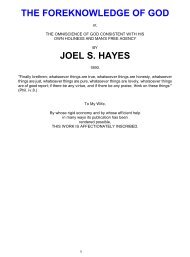Are Men Born Sinners? - Library of Theology
Are Men Born Sinners? - Library of Theology
Are Men Born Sinners? - Library of Theology
Create successful ePaper yourself
Turn your PDF publications into a flip-book with our unique Google optimized e-Paper software.
where only the potency comes into account which tends to the realization <strong>of</strong> the fact; but<br />
it is not discordant with Paul's usage. He represents, for example, believers as having died<br />
with Christ, or as having been crucified with Him.<br />
Why? Simply because the death <strong>of</strong> Christ had in itself a potency for extirpating or<br />
crucifying the old man with his carnal and sinful disposition. So in like manner as regards<br />
the sin <strong>of</strong> Adam. <strong>Men</strong> did not actually sin in his sin, or become sinners through him<br />
without an exercise in detail <strong>of</strong> personal agency, any more than they were actually<br />
crucified with Christ. Why should a prosaic and rigorous construction be demanded in the<br />
one instance and be excluded in the other? In either case, and no less in the one than in<br />
the other, it is reasonable to take the words <strong>of</strong> the apostle as religious oratory, in whose<br />
vivid strain the tendency is treated as substantially identical with the fact toward which it<br />
tends.<br />
If the passage in the fifth chapter <strong>of</strong> Romans is not to be regarded as teaching the<br />
condemnation <strong>of</strong> all men on the simple ground <strong>of</strong> Adam's sin, no more can such a tenet<br />
be found in Eph. ii. 3. The context <strong>of</strong> the clause, "by nature children <strong>of</strong> wrath,"<br />
emphasizes the force <strong>of</strong> ungodliness in both Jews and Gentiles. There is nothing in the<br />
connection to hint that the sin <strong>of</strong> Adam was in the thought <strong>of</strong> the apostle. As little is there<br />
any indication that he was thinking <strong>of</strong> the state <strong>of</strong> new-born infants. It is the ingrained<br />
sinfulness <strong>of</strong> contemporary men, manifested in the fulfillment <strong>of</strong> fleshly desires, upon<br />
which he is dwelling. Surveying this rank <strong>of</strong> conscious accountable transgressors, and<br />
viewing them as living out a characteristic tendency or disposition, Paul speaks <strong>of</strong> them<br />
as by nature children <strong>of</strong> wrath. Would the apostle, apart from the assumed fact <strong>of</strong> a<br />
personal appropriation and living out <strong>of</strong> abnormal tendencies, have regarded any <strong>of</strong> this<br />
group as actually subjects <strong>of</strong> God's wrath? We believe it rash to assume that he would. He<br />
has nowhere described little children as under the wrath <strong>of</strong> God. It is to be noticed,<br />
moreover, that Paul has given us a hint that the term phusei, "by nature," is not<br />
necessarily to be understood <strong>of</strong> a condition resulting simply from birth. In Rom. ii. 14 he<br />
speaks <strong>of</strong> the Gentiles as doing "by nature" the things <strong>of</strong> law. Now, evidently he did not<br />
mean that they were born doers <strong>of</strong> the law, but only that they were born with a nature<br />
adapted to provide in due time for a sense <strong>of</strong> moral obligations. In like manner the phrase<br />
in Ephesians may reasonably be taken as meaning, not that men are born children <strong>of</strong><br />
wrath, but only that by birth they have a nature which tends to such personal choice and<br />
conduct as invite the divine displeasure. In any case, if we bring the New Testament into<br />
view, the scene <strong>of</strong> Christ blessing little children, and declaring that "<strong>of</strong> such is the<br />
kingdom <strong>of</strong> heaven," must be regarded quite as truly indicative <strong>of</strong> their standing before<br />
God as a brief phrase in an epistle, in which there is no specific mention <strong>of</strong> children and<br />
no certain reference to their standing.<br />
Return to the Index






